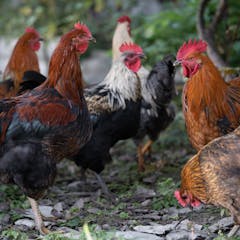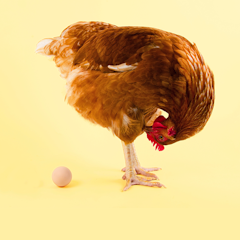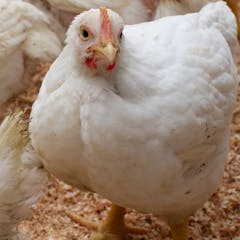
Articles on Chickens
Displaying 1 - 20 of 78 articles

The collection is a creative reinterpretation of the passions of a muse the designer never met but got to know through Debo’s belongings and surroundings.

Our approach to combating pandemics must shift to one that prioritizes prevention of human infections with zoonotic viruses, rather than focusing on rapid response once human infection is widespread.

Can the virus transfer from infected farm animals to contaminate milk, meat or eggs? It depends on where you are and how well you cook your food. But for most of us, the chances are low.

The genetic mutations responsible for the unusual physical features in animals can also cause great harm.

Bird flu in U.S. dairy cows has Canadian public health experts on high alert. With one human case identified in Texas, what is the likelihood of H5N1 influenza moving from birds to mammals to people?

Artificial intelligence can process large amounts of chicken vocalizations, identifying patterns in the birds’ communications.

Impress your niece or nephew with these T rex facts.

Grandma swore by it. Now science weighs in on the healing powers of chicken soup.

New and innovative thinking is needed to deal with the reality on the ground in South Africa.

Evolutionary biology and the fossil record reveal a great deal about the origins of chickens and eggs.

Vaccination against bird flu offers farmers hope, rather than being caught between the anguish of finding a sick bird and the desolation of having to slaughter their entire flock.

A microbiologist on the deadly germs lurking in your kitchen and why you need to wash tea towels and dishcloths more often.

Tracking data suggests individual chickens have very different movement patterns.

The Supreme Court has upheld a controversial California law requiring pork sold in-state to be humanely raised, no matter where it’s produced. Pork producers say it could drive up food prices.

Charles’s culinary choices might be intended to recognise the multiculturalism of Britain today. But they are also a reminder of the difficult legacy of empire.

Avian influenza — commonly known as ‘bird flu’ — is infecting domestic and wild birds in Canada and around the world.

Parents provide the energy needed for their young to grow large brains. Climate change may negatively affect birds’ brain development as it impacts food supplies.

Though preferable to battery farms, free-range eggs are not as safe and ethical as customers think.

A biologist who studies how viruses spread from animals to people explains the process of spillover and the risks posed by the new bird flu that has spread across the globe.

Washing raw chicken can splash bacteria around the kitchen. It’s best just to properly cook the chicken without washing it. So why do people still wash? Time to bust some chicken-washing myths.
